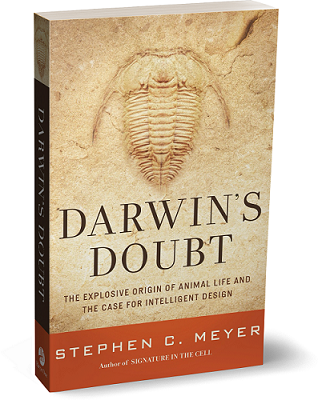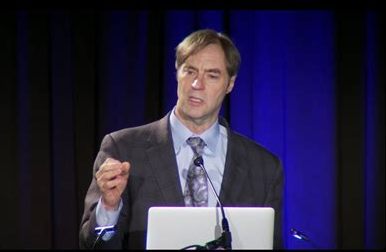|
home | what's new | other sites | contact | about |
|||||
|
Word Gems exploring self-realization, sacred personhood, and full humanity
Dr. Stephen C. Meyer's An Investigation of the 'Cambrian Explosion'
return to "Evolution" main-page
Editor's note: The following information is from chapters nine through twelve of Darwin's Doubt.
Combinatorics is a branch of mathematics which investigates the possible ways things might be combined. It’s a form of probability theory. For example, two letters, A and B, can be combined in four different ways, or 22 possible combinations: AA, AB, BB, BA. Three letters offer eight different possible combinations, or 23 possibilities. Four letters would equal sixteen possible combinations, or 24. And so on. How big is big here? To gain a measure of perspective, the typical gene, providing code to produce a certain protein, will be comprised of a specific sequence of one thousand nucleotide bases (or more). There’re four nucleotide bases, and so we would write 41000. This is a gargantuan number. Just how gargantuan? Consider that in the entire Milky Way galaxy there are but a mere 1065 atoms. And 1080 atomic particles in all the universe. Let's also note that the 15 billion years of our universe is 1018 seconds. For randomness and chance to investigate 41000 possible combinations of nucleotide sequences, allowing for one second (or less time, if you like) per investigation, would require a duration of time far, far longer than the entire history of the universe; truth be told, trillions and trillions of universe-durations would be needed. We discussed this in earlier articles featuring the work of Dr. Rupert Sheldrake. But Dr. Meyer offers more detail. We’ll ask Kairissi and Elenchus to fill us in.
Elenchus. So many explosions going on around here. First we had the “Cambrian Explosion” and now there’s the “Combinatorial Explosion.” Kairissi. We need some explosion insurance. E. Well, the question that people will ask now, if Darwinism is up against odds of “trillions of universes,” how do they answer that? And why haven’t they just packed up and gone home now? K. But they haven’t packed up and gone home, but have doubled down on their malfeasance. And this is the real story that needs to be looked into. We’ll be listing some of their “Wile E. Coyote” schemes to keep Darwinism afloat in the wake of “trillions of universes.” But, I have to say – I have to say it again – I am deeply troubled by the tactics of the Darwin lobby. E. You have the microphone, Kriss. K. The Darwin lobby has no credible answer to support their tortured theory. And in this retreat to “damage control” posture, they become increasingly unhinged, vicious, and mafia-like. An exaggeration on my part? I think not. Consider the case of Dr. Richard Sternberg, as outlined by Dr. Meyer. In 2004 Meyer wrote an article which appeared in a biology journal, Proceedings of the Biological Society of Washington, associated with the Smithsonian’s National Museum of Natural History. The article discussed the Cambrian Explosion, the unlikelihood of randomness to have effected macro-evolutionary change, and the need to consider Intelligent Design as an alternative theory. E. That article brought on a tidal wave of controversy. K. The Darwin lobby didn’t know how to deal with it. As they had no credible response, they did not want to confront Meyer directly because they could not win on the merits of the case. And so they attacked Dr. Richard Sternberg, the journal editor who had allowed publication of Meyer’s writing. E. They killed the messenger. K. That’s right, they killed the messenger. Smithsonian higher-ups took away Dr. Sternberg’s keys, his office space, and unceremoniously transferred him to some flunky hide-away department. E. Think about this. Consider the chilling effect. All of the Darwinian cult members would witness this public flogging, tremble with fear, and exclaim, “We’d better be careful what we say or we’ll be next. If we lost our academic positions, what would happen to our pensions, and how would we pay the mortgage? - we’d be disgraced, our government research grants would be pulled, and we’d probably lose our marriages and end up in the poor house.” K. These Orwellian brown-shirt tactics are common in religion and the corporate world, but we expect more from science. However, this is not science, but a good-old-boy network of private agenda to be protected. E. (sighing) K. Meyer cites other instances of heavy-handedness and disinformation campaign by the Darwin lobby, but I will leave it at that. E. As you were speaking, I was thinking of another aspect of double-standard. There is a phrase, “Extraordinary claims require extraordinary evidence.” On the surface, this could almost seem reasonable. But it’s used as a form of censorship. K. It’s like the bogus “hate crime.” We already have laws on the books protecting us from attacks by others, but a “hate crime” can mean anything you want it to mean. If someone disagrees with you, you can call it a “hate crime.” E. Yes, exactly, that sort of thing. And the “extraordinary claim” is used in the same way. If you disagree with the new finding, as Darwinists disagree with people like Meyer, they can call it an “extraordinary claim” – which, so conveniently for the status quo, will now require “extraordinary evidence.” And what will be the nature of this “extraordinary evidence”? It will be a very high bar, far too high to reach. All you have to say in rebuttal is “That evidence isn’t good enough to overcome your extraordinary claim.” And the way this game is played, no evidence will ever be good enough to satisfy those who do not want to hear. K. This kind of fallacious reasoning is used all the time to disparage the evidence for the afterlife. As Dr. David Fontana pointed out, you can have thousands of experiments, offering odds of “billions to one” in favor of the afterlife evidence, but it will never be good enough for those who have a vested interest in maintaining things as they are. E. We need one standard of evidence to be applied to all investigations. All lawyers know about rules of evidence, and you’re not allowed to have special rules of evidence just because a particular subject offends your private prejudices. K. But all of this is far too reasonable to sway the Darwin crowd. With them, it’s all mafia tactics now to get their way. E. Let’s talk about the details of the “Wile E. Coyote” schemes Darwinists use to answer the charge of “trillions of universes.” K. I guess we should do that, but I do so reluctantly. Their arguments are so lame, so contrived, so “let’s paint the target around the arrow.”
However, here’s one: Darwinists published a paper in Nature Reviews Genetics entitled, “The Origin of New Genes: Glimpses from the Young and Old.” Therein, the authors made claim to how new genes, and therefore, new species, come into being. A federal judge referred to this article in ruling against Intelligent Design concerning a certain school district. But, as Meyer points out, the article presents no such evidence. Instead, the writing in question argues from the basis of genes already in existence; in other words, large amounts of genetic code serve as pre-existing foundation for their assertions of how species are developed. E. It’s sort of like trying to get a loan at the bank. They’ll loan you all the money you want if you can show that you have plenty of pre-existing resources and don’t need the loan. K. And here’s another scheme: Darwinists asked the question, “What if certain proteins could have a functional substitute?” E. Like using a synonym for another word. K. That’s right. And there are certain experiments which suggest, under certain conditions, that this might be possible. And here’s a related effort: “What if we didn’t have to invent the entire DNA code; what if certain whole sections of code – not just a digit here or there – could be lifted from one organism and used by another. This would speed up the entire evolutionary process.” And, again, there are certain suggestive experiments which seem to indicate success in this area. E. We should point out, however, even if these procedures succeeded, let's say, in producing one beneficial mutation, it would not help the case of Darwinism. A single mutation is of no benefit. As one scientist quoted by Meyer said, the evolutionary process "seems to require many thousands, perhaps millions, of successive mutations to produce even the easiest complexities we see in life now. It appears, naively at least, that no matter how large the probability of a single mutation is, should it be even as great as one-half, you would get this probability raised to a millionth power, which is so very close to zero that the chances of such a chain seem to be practically non-existent." K. That's quite a statement: even if the chances were raised to one-half... E. That is, 50% - like flipping a coin. K. Which would seem to greatly benefit Darwinism, but it still wouldn't work out for them because a single mutation is of no advantage. To be efficacious to the evolvement of a life-form, a sequence of "perhaps millions" of mutations is required. E. The Darwinists would throw a victory party at the prospect of creating one single mutation, and declare to the press that "the origin of life has been solved," but the reality is quite different. K. None of these attempts by Darwinists amounts to anything, and none answer the problem of "trillions of universes." I'm going to stop listing these schemes because none of them actually create anything new. Do you see the pattern? E. Why don’t you spell it out for us? K. All of these schemes are but variations of Dr. Sheldrake’s joke:
K. All of these schemes want to begin with genetic material already in place, hot and cooking, ready to go. It's their "one free miracle." What they’re really saying is, “We can get from here to there only if you'll just allow us one simple little insignificant protein to build on.” E. But, as Sheldrake and Meyer explain, that simple little protein is not so simple. It has to be folded in a very particular way. And the possible combinations of folding, for randomness to figure this out, would require a duration of time far, far longer than the history of the universe. K. Oh, that little thing again. E. Here’s what I see. On their side, they are very rigid and meticulous when it comes to accepting any evidence that is “consciousness based” which would support post-mortem existence. But when it comes to propping up their theory, any small straw, the smallest suggestion, of seeming affirmation is leapt upon and made much of. K. They “swallow the camel” so readily. E. It’s all very one-sided, just a witch-hunt, a kangaroo-court, an Inquisition, the way Big Religion used to do it. This is not science but rank cultism. Dr. Stephen Goldman has an entire college course on "bad science" and errant claims to knowledge. K. And, Elenchus,, I see this, too. Even if we were to grant their little schemes of furthering the evolutionary process by way of expediting the production of proteins, none of this would address the big elephant in the room. E. Which is? K. The Cambrian Explosion. It’s one thing to say “I’ve found a way to modify proteins,” but it’s a whole other world to make sense of one of the pivotal events of all history: How do you explain the sudden coming-into-being of myriads, a burgeoning army, of all sorts of new creatures? – ones never seen before! E. Proteins are one thing, but proteins, or genes, do not contain "tiny little blueprints" to construct one animal, to say nothing of an entire new zoo. K. Sheldrake has said a lot about the lack of "tiny blueprints." And so, the question must be asked, how did all of these new forms of animals come to be? The body-plans are not in the DNA, and natural selection is hopeless here, too, as it's only an "editor" not a creator of existing organisms. E. And, not only were the Cambrian animals never seen before, but this new riotous collection of creatures, many of which, were so different from earlier life-forms, that it’s not possible to say “this one came from that one.” K. In this vein, as many biologists have pointed out, these new creatures brought with them a boatload of new genetic code - never seen before. Where did that new code come from? Concomitantly, that new code produced all sorts of new proteins on planet Earth; much of which was far more complicated than the proteins of predecessors of earlier eons. E. Where did all this new material, by the semi-truckload, come from? K. Again, even if we felt in a generous mood and granted the Darwinists a few “trillions of universes” of time to make good on their schemes of the hegemony of randomness – none of this would help them a bit. E. Yes, I see… It wouldn’t help them because the Cambrian Explosion of new animals did not occur over trillions of years, but, geologically speaking, it all happened, virtually, overnight. Randomness, if it were a factor, would have had no time to work. K. It’s all a hard sell and very problematic for them, but they keep trying because no Rudyard Kipling “just so story” is too tall to believe, if that’s what you want to believe.
|
|||||
|
|




